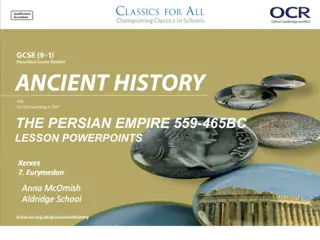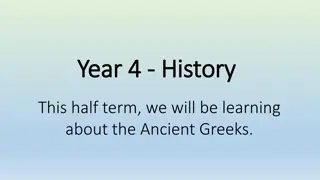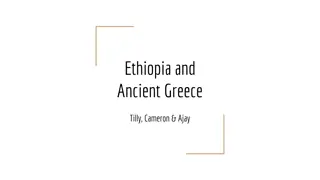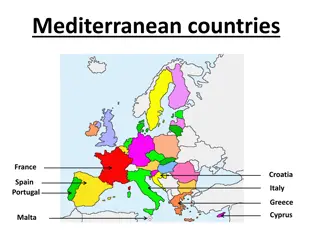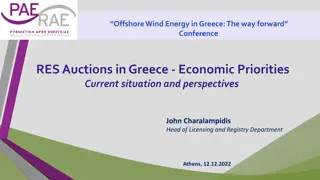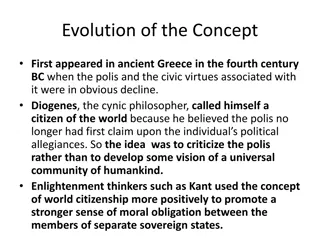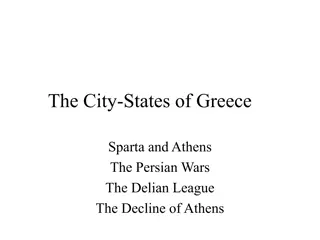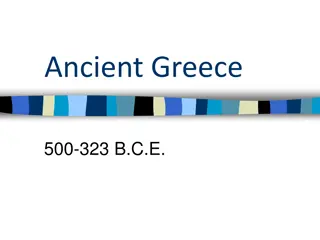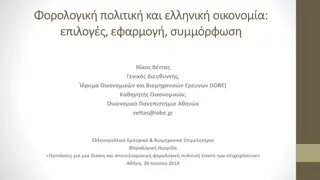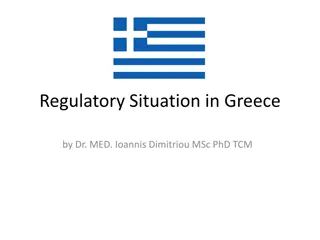
Greek Educational System: Structure, Levels, and Overview
Explore the comprehensive Greek educational system, encompassing Early Education, Primary Education, Secondary Education, Higher Education, and Lifelong Learning. Discover the compulsory education age range, unique features of Primary Schools, and the blend of public and private schooling in Greece.
Download Presentation

Please find below an Image/Link to download the presentation.
The content on the website is provided AS IS for your information and personal use only. It may not be sold, licensed, or shared on other websites without obtaining consent from the author. If you encounter any issues during the download, it is possible that the publisher has removed the file from their server.
You are allowed to download the files provided on this website for personal or commercial use, subject to the condition that they are used lawfully. All files are the property of their respective owners.
The content on the website is provided AS IS for your information and personal use only. It may not be sold, licensed, or shared on other websites without obtaining consent from the author.
E N D
Presentation Transcript
GREEK EDUCATIONAL SYSTEM PLATON SCHOOL
GREEK EDUCATIONAL SYSTEM Over the years, the Greek Ministry of Education and Religious Affairs adapting state-of-the-art research in the field of education, as well as foreign education practices to meet the needs of the Greek society and labor market has resulted in a multilayered education system, which caters for all students in the country. Most students in Greece attend public schools of all levels, for which there are no tuition fees while, according to the Hellenic Statistical Authority, between 4 and 6.5% of the student population enrolls in private schools of all levels.(source: I Kathimerini daily newspaper- for further resources see The Greek Educational System)
Structure of the Greek Education System Education in Greece is compulsory for all children between the ages of 4 and 15. The education system is divided into Early Education and Care for children up to the age of 6; Primary Education for schoolchildren between the ages of 6 and 12, Secondary Education for teenagers between the ages of 12 and 18, Higher Education for those wishing to attend university courses, and, finally, Lifelong Learning, which caters for adult students of all ages.
Early Education and Care In Greece there are Daycare Centers which provide children up to the age of 4 with pre-school education. The last stage of pre-school education is carried out in Kindergarten Schools, where young students take preparatory courses for two years before enrolling in primary/elementary schools. AGE 0-3 Daycare center AGE 4-6 Kindergarten school Experimental Kindegarten School
Primary Education Primary Schools welcome children of the age of 6. Some of these schools are termed Experimental or Model" schools, as they carry out experimental education practices, and are supervised by university departments specializing in pedagogics and primary education. There are also primary schools which cater for students with physical or mental impairment, or special needs. In all three types of primary schools, students learn basic skills in a number of subjects, like Language Reading and Writing, Environmental Studies, Maths, and English. Primary Schools in Greece operate between 8am and 1pm, while the majority of those offer extra classes on Physical Education, Art and Music until 4pm. AGE 6-12 (COMPULSORY) Primary school Experimental Primary School SPECIAL EDUCATION Model Primary School Primary School for students with Special Needs
Secondary Education By law, all students graduating from primary education enroll and attend courses in a Junior High School. There are several types of Junior High Schools in Greece. Most students attend the Junior High School they are assigned to, which is usually located in their neighborhood. There are other alternatives, though, like being admitted to an Experimental Junior High School through a lottery system, or attending a Model Junior High School, after taking a nation-wide entrance exam. Students who have a special interest in painting, drama, dancing or music may attend a Junior High School that specializes in the field. There are also Junior High Schools which address students from a multicultural background, as well as students with special needs. Most Junior High Schools operate from 8am to 2pm, but there are also evening schools that operate from 7pm till 10pm for students mainly adults who work during daytime. A variety of subjects are taught in Junior High Schools, including Modern and Ancient Greek Language, Maths, Physics, Chemistry, Geography, History, Physical Education, Religious Studies, Music and Art, while special emphasis is given to foreign language learning, as students are taught both English and another European language of their choice (students tend to choose between French and German). Students take exams some of these subjects at the end of each school year.
Secondary Education Although upper level Secondary Education is not compulsory in Greece, most students attend High School. At this level, students may opt to attend a General High School, an Experimental General High School or a Model General High School (mainly for graduates of Experimental and Model Junior High Schools respectively), or any High School specializing in music or the arts. Students from foreign countries can enroll in a Multicultural High School, while there are Special Vocational Education & Training Institutes for students with special needs. Students may also pursue vocational training in Vocational High Schools, or, once they are 16, they may enroll in a Vocational Evening High School and graduate after 4 years of study. In addition, there are Vocational Training Schools; in these schools, as well as in all Vocational High Schools students attend general education courses combined with workplace courses. At the final stage of their studies, a student may work as an apprentice and gain valuable work experience. As of September 2021, there are also Model Vocational High Schools.
Secondary Education Greek High Schools offer a combination of General Education courses and Advanced Placement courses. Students who wish to pursue studies in Higher Education take Panhellenic exams in a specific number of Advanced Placement courses which fall into one of the following categories: Humanities, Science and Medical Studies, Finance and Computer Science Studies. This is considered to be a tough and highly competitive exam process that students go through in order to ensure education at a higher level.
Secondary Education AGE 15-18 General High school General Evening High School Experimental High School Model High School Music High School Arts High School Multicultural High School Special Vocational Education & Training Institutes AGE 12-15 (COMPULSORY) Junior High school Evening Junior High School Experimental Junior High School Model Junior High School Music Junior High School Arts Junior High School Multicultural Junior High School Junior High School for students with Special Needs VOCATIONAL EDUCATION Vocational High School Vocational Evening High School Model Vocational High School Vocational Training Schools
Higher Education The percentage of university graduates is considerably high in Greece. Most of them attend four-year studies in University departments and in Technological University departments, as well as in the various departments of the School of Pedagogical and Technological Education, while those attending Technical University departments specializing in fields like architecture and engineering graduate after five years of studies. Students who wish to enroll in the School of Fine Arts take special exams, and graduate after five years of studies too. Courses in Higher Education institutes in Greece are in the form of lectures or workshops, and most of the courses last one semester, that is, at least 13 weeks. Most university departments in Greece offer one-year or two-year postgraduate courses, as well as the opportunity to pursue a doctoral degree. Students may also enroll in the Hellenic Open University for graduate or postgraduate studies, where they pay tuition fees, and are admitted through an annual lottery system.
Higher Education FROM THE AGE OF 18 University Technological Educational Institute School of Pedagogical and Technological Education School of Fine Arts Hellenic Open University
Lifelong Learning Lifelong Learning centers are the main providers of Lifelong Learning in Greece, and they usually supervised by Municipality services. These centers offer a variety of courses, aiming at both formal and informal education. On the other hand, Vocational Training Institutes and Vocational Training Schools often adapt their curriculum to suit the needs of their adult students and of the labor market. Finally, Second Chance Adult Education Schools cater for those students who have dropped out of school at some point in their life, but wish to continue with their studies at a later date. Lifelong Learning Centers Second Chance Adult Education School VOCATIONAL EDUCATION Vocational Training Schools Vocational Training Institutes




